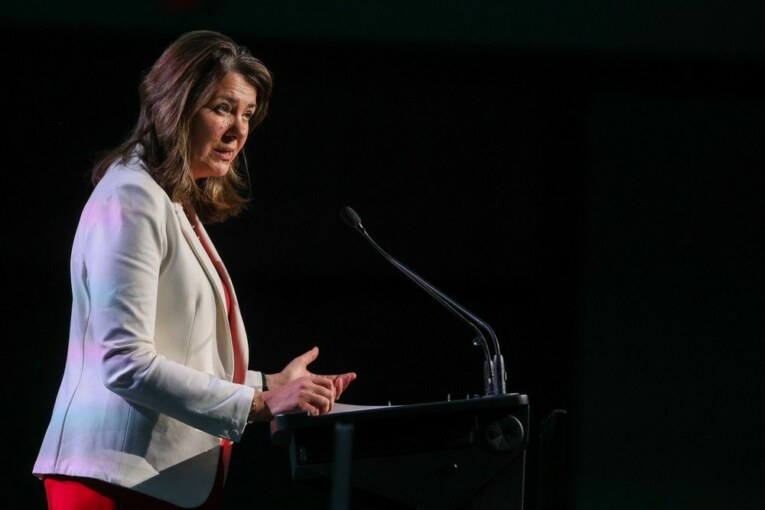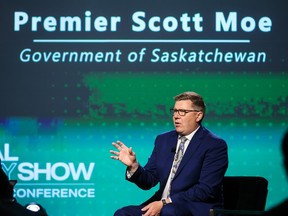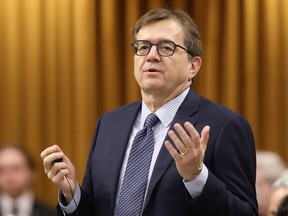
[ad_1]
Canada’s natural resources minister insists he’s not looking for a fight with Alberta’s premier when they meet next week in Calgary.
He wants to collaborate with Danielle Smith.
And Jonathan Wilkinson, who introduced the new federal Canadian Sustainable Jobs Act on Thursday, says he wants to co-operate with the provinces on progressing energy policy.
But as he prepares to sit down with Alberta’s premier on Monday, Wilkinson doesn’t agree with Smith — nor Saskatchewan Premier Scott Moe — that Ottawa’s plans for a net-zero power grid are too costly and unfeasible.
He flatly rejects Smith’s assertion that an incoming federal limit on emissions from the oil and gas sector is a back-door plan to cap production.

The two sides can talk about getting along, yet the chasm between them is so vast, it would require Tony Hawk to successfully jump it and land without a spill.
“I am not interested in having a fight,” Wilkinson, the MP for North Vancouver, said in an interview this week.
“My approach to the meeting on Monday is to find pathways to collaborate, not to have an argument.”
The Trudeau government and Alberta have squared off on multiple environmental and energy matters in recent years, from the national carbon tax to Bill C-69.
On Tuesday, Smith talked about drawing a line in the sand over the twin issues of the federally mandated oilpatch emissions cap and Ottawa’s move to a net-zero electricity system.
She also insisted collaboration is her first choice.
Speaking at the Global Energy Show, the premier said she will sit down with Wilkinson and federal Intergovernmental Affairs Minister Dominic LeBlanc to discuss the contentious energy and climate files.
They will be joined by Alberta Energy Minister Brian Jean and Environment Minister Rebecca Schulz.
Where exactly is the room for compromise?
Smith told reporters she’s prepared to fight “with every power that we have” to protect the province’s jurisdiction to manage its natural resources. She even held out the possibility of using her government’s new sovereignty act, if necessary, in a clash.
Ottawa’s attempts to introduce climate policies, and the province’s ability to manage resource development, are once again the front lines of a tussle between the Liberal government and Alberta.
The oil and gas sector is Canada’s largest emitting sector, but also a massive job creator and source of investment, taxes and royalties.
Companies and industry groups have warned that Ottawa’s plan for the cap, along with the government’s goal of curbing oilpatch emissions by 42 per cent by 2030, could force production to be shut in.
Wilkinson rejects the notion.
“It is not a production cap, it’s an emissions cap,” he said.
“The sector itself is saying they can significantly reduce emissions. It has to be technically feasible within the timeframe, and we have to be creative about how we do it. We have to be ambitious.”

Industry, however, remains concerned.
The federal government needs to be realistic about what the industry can accomplish by 2030, MEG Energy CEO Derek Evans said this week.
He noted the Pathways Alliance oilsands group is striving to reach net-zero emissions by 2050 and believes it can curb them by about 30 per cent by the end of this decade.
“We don’t think the 42 per cent (goal) that is currently out there is something we could achieve by 2030,” Evans said.
“Why are we so fussed about the bloody numbers? Shouldn’t we be more fussed about the fact, are we actually doing something? Are we moving forward? Are we making progress?”
Alberta passed legislation for a 100-megatonne emissions cap on the oilsands sector last decade, but never passed the regulations, in part because it was too difficult to figure out how to divide it up, noted Richard Masson, an executive fellow at the University of Calgary’s School of Public Policy.
“How are we going to allocate this federal emissions cap, with declining emissions over the years, amongst the entire oil and gas sector?” asked Masson, former CEO of the Alberta Petroleum Marketing Commission.
The issue of a net-zero grid is equally problematic for provinces such as Alberta, Nova Scotia and Saskatchewan, which rely heavily on fossil fuels to generate electricity.
Smith and Moe insist the issue falls fully within provincial responsibility, not Ottawa’s domain, and they will pursue a net-zero power grid by 2050.
“The federal government can pass all the regulations they like in this space,” Saskatchewan’s premier told reporters at the Global Energy Show.
“And if they want to litigate when a province makes this decision or takes up their jurisdictional space, so be it. I would expect that it would be a fairly quick and succinct litigation in the province’s favour.”
Wilkinson disagrees.
He also believes the 2035 goal is achievable — contrary to the view of the two Western premiers — while keeping an eye on electricity affordability.
“With respect to the Sovereignty Act … I think the federal government is well within its jurisdiction with respect to these policies. But we want to make sure we’re doing this in a manner that is smart,” Wilkinson said.
“It has to be about doing this in a way that is actually going to work for Alberta and is going to work for Saskatchewan, just as it has to work for Nova Scotia.”
Those aren’t fighting words.
It’s not exactly an olive branch being extended, either.
Since he took over the portfolio in 2021, Wilkinson has talked about dialing down the rhetoric over the frequent energy disputes.
Ottawa ditched the much-hated moniker Just Transition from the name of its new Canadian Sustainable Jobs Act.
That was a small step.
Monday’s meeting could provide the opportunity for both governments to move forward in a bigger way.
It could also go nowhere.
However, progress will require both sides to show they’re actually willing to compromise when they sit down face to face next week — and not just simply talk about it.
Chris Varcoe is a Calgary Herald columnist.
[ad_2]
You can read more of the news on source
